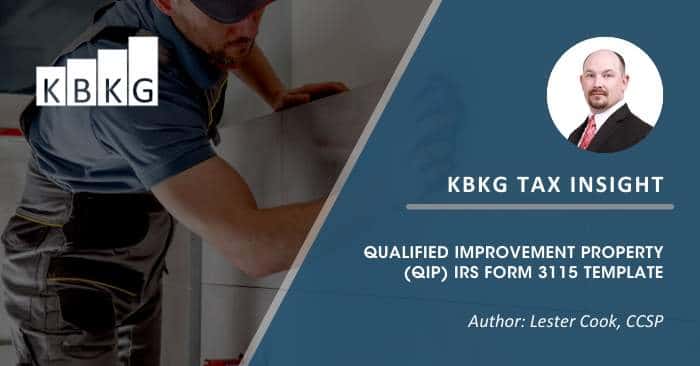On April 17, 2020, the IRS released Rev. Proc. 2020-25 outlining how to implement the Qualified Improvement Property (QIP) changes that were part of the CARES Act of 2020 and modify certain elections under Section 168 using Form 3115, Change in Accounting Method. KBKG authored a comprehensive overview of the new procedures that can be found here.
KBKG has put together a sample Form 3115 template with attachments for these new changes using Designated Change Numbers (DCN) 244 and 245. This template is free and can be accessed in our Resource Library.
QIP is defined as any improvement made by the taxpayer to an interior portion of a building that is nonresidential real property as long as the improvement is placed into service after the building was first placed into service by any taxpayer (IRC §168(k)(3)). Additionally, QIP specifically excludes expenditures for (1) the enlargement of a building, (2) elevators or escalators, or (3) the internal structural framework of a building.
KBKG Insight: Consider a limited scope cost segregation to separate QIP from non-QIP costs when improvements are not solely related to tenant interior spaces and exceed $1 million. Cost segregation also makes sense for states that do not conform to federal bonus depreciation.
Contact a KBKG specialist to discuss options on how to maximize depreciation deductions and limit your exposure related to QIP property. Our team is available to answer any questions you may have.
You can download our Qualified Improvements Quick Reference Chart for an easy-to-use resource reflecting these new changes for free, by joining our mailing list. Download will be available immediately following submission:
Access the Qualified Improvements Quick Reference Chart
Author: Lester Cook, CCSP
Contributors: Gian Pazzia, CCSP; Malik Javed, CCSP; Sumit Sharma, CCSP
Download KBKG Tax Insight: Qualified Improvement Property (QIP) IRS Form 3115 Template
 Lester Cook, CCSP – Principal
Lester Cook, CCSP – Principal
Midwest
Lester has nearly 20 years of experience in the tax specialty service industry. He is a Principal and leads KBKG’s Fixed Asset Review Practice from our Chicago, IL office. Throughout his career, Lester has completed cost segregation analyses on thousands of properties ranging from office space leasehold improvements to multi-billion dollar industrial complexes. » Full Bio


